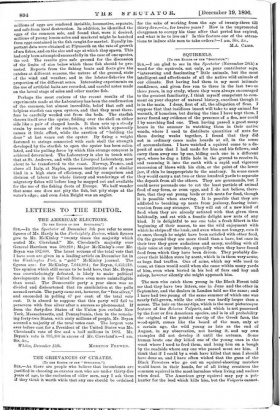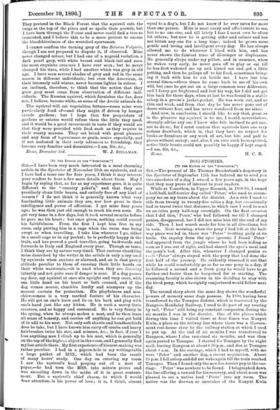SQUIRRELS.
[To THE EDITOR Or THR "IIIPECTATOR.n SIR,—I am glad to see in the Spectator (November 28th) a word for the squirrels, not only, as your contributor says, "interesting and fascinating" little animals, but the most intelligent and affectionate of all the native wild animals of our climate. But having had them in my most intimate confidence, and given free run to three in the last two or three years, in my study, where they were always encouraged to the greatest familiarity, I think myself competent to com- ment on your chapter of natural history, excellent though it is in the main. I deny, first of all, the allegation of fleas. suppose that that insidious insect will take to any animal for warmth, if homeless, but during the time I have kept them, 1 never found any evidence of the presence of a flea, nor could I by searching find one. Then having passed a great many. hours in the summer in watching them in their native woods, where I used to distribute quantities of nuts for them during weeks together, I found that they did not in ordinary cases make hoards at all, in the sense of accumulations. I have watched a squirrel come to a de- posit of nuts that I had made for him and his fellows, and carry them away one by one, hiding each one in a different spot, where he dug a little hole in the ground to receive it, and ramming it into the earth with a rapid and vigorous succession of blows with his chin, or the point of the lower jaw, if chin be inappropriate to the anatomy. In some cases they would carry a nut two or three hundred yards to separate the deposit from all the others. They are gourmands, but I could never persuade one to eat the least particle of animal food of any form, or even eggs, and I do not believe, there- fore, that they eat young birds or rob nests for food, though it is possible when starving. It is possible that they are addicted to breaking up nests from jealousy, fearing inter- vention from any stranger. They will eat of a new kind of food when they are already satiated with that given them habitually, and eat with a frantic delight new nuts of any kind. It is delightful to see one take a fresh filbert in the beginning of their season, to see the wild enjoyment with, which he strips off the husk, and even when not hungry, eats it at once, though he might have been satisfied with other food. On the ground they are more timid than a hare, but once in their tree they grow audacious and saucy, scolding with all their voice at any intruder, especially when they have found food from which they have been driven. They probably dis- cover their hidden store by scent, which is in them very acute, as hogs find truffles. One of mine, which my wife used to, tease, at times would scold when she came within many yards of him, even when buried in his bed of furs and hay awl asleep, however silently she might approach him.
The men who catch them young in the Black Forest told me that they have two litters, one in June and the other in September, and the dealers in London told me the same; and I have had two young of the same summer of which one was nearly full-grown, while the other was hardly larger than a mouse. The hair on the ear-tips, which is the most picturesque feature of the Sciurus Vulgaris, and which is not possessed by the four or five American species, and is in all probability the original of the pointed ear-tip of the Greek faun, the wood-spirit, comes like the beard of the man, only at a certain age, the wild young as late as the end of August, in my observation, not having it, and my own examples did not develop it until the autumn. Some human brute one day killed one of the young ones in the wood where I used to feed them, and hung him on a bough by the roadside where any one who passed must see him. I think that if I could by a wish have killed that man I should have done so, and I have often wished that the guns of the Black Foresters who go out on squirrel-shooting matches would burst in their hands, for of all living creatures the common squirrel is the most harmless when living and useless when dead. The American grey squirrel may pay a pot- hunter for the lead which kills him, but the Vulgaris cannot. They pretend in the Black Forest that the squirrel eats the twigs at the top of the pines and so spoils their growth, but I have been through the Forest and never could find a tree so truncated, and I believe this to be a mere pretext to excuse the bloodthirstiness of the wretched sportsman.
I cannot confirm the turning grey of the Sciurus Vulgaris, though I am not prepared to dispute it, if observed. Mine aever changed colour, but I had one of a negroid variation, a dark pearl grey, with white breast and black tail and ears, the most exquisite creature I have ever been; but he never changed his tints, while I had another which was grey in old age. I have seen several shades of grey and red in the same season in different individuals; but even the American, in their intensely cold winter, never become lighter in colour. I am inclined, therefore, to think that the notion that they grow grey must come from observation of different indi- viduals. The Russian squirrel, which furnishes the fur, does cot, I believe, become white, as some of the Arctic animals do.
The squirrel will eat vegetables, lettuce—roses mine were particularly fond of—and they might if driven by hunger invade gardens ; but I hope that few proprietors of gardens or estates would refuse them the little they need, and it would be a good investment in taste if they would see that they were provided with food such as they require in -their scanty seasons. They eat bread with great pleasure and any form of leguminosm or grain, maize especially, and if not molested in their early advances to friendship, they ,become very familiar and decorative.—I am, Sir, &c.,











































 Previous page
Previous page